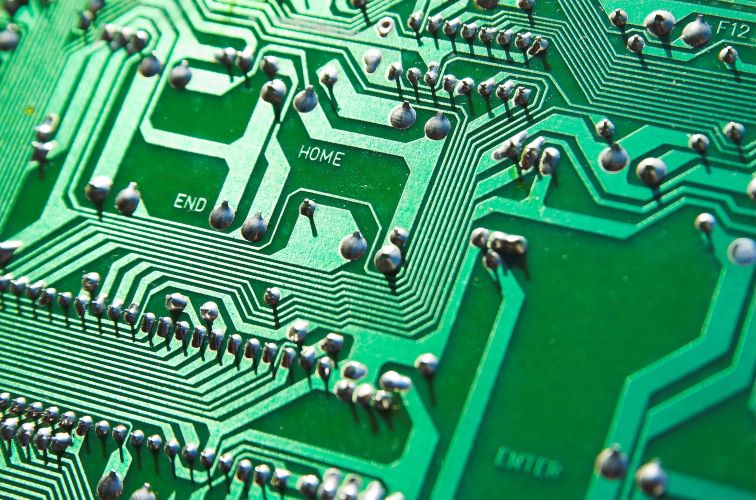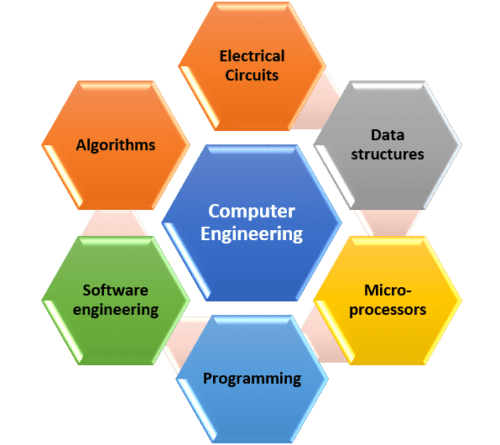The curriculum for aspiring computer hardware engineers has a reputation for being challenging. Your computer engineering class requirements will include plenty of math, science and highly technical computer and engineering courses. Before you can graduate, you will need to prove that you can apply engineering concepts to creating electrical and computer-based solutions to problems by completing your computer engineering course requirements, which can be extensive. However, students who have the dedication to complete this difficult curriculum are rewarded with a career that carries a high earning potential, including a six-figure median salary.
IMAGE SOURCE: Pixabay, public domain
Choosing Computer Engineering as a Major
Most computer hardware engineers enter the field with a degree in computer engineering from an ABET (Accreditation Board for Engineering and Technology)-accredited program. Through a combination of classes needed for computer engineering, this degree program equips students with both engineering knowledge and computer science skills. The benefit of majoring in computer engineering, rather than a more general engineering degree or a computer science degree without the engineering focus, is that the curriculum for computer engineer majors brings together these two fields of study that go into the computer hardware engineer occupation.
You don’t have to major in computer engineering specifically to work in this role. Some aspiring hardware engineers begin preparing for their career by earning a computer science degree or an electrical engineering degree instead, the United States Bureau of Labor Statistics (BLS) reported. There are tradeoffs to choosing one of these educational paths.
Computer science degree programs include less of an emphasis on engineering, which is the application of science and math principles to real problems. Instead, this major focuses more on programming, database administration and network communications, all of which are valuable skills for computer hardware engineers. The drawback of majoring in computer science is that the degree program may not provide the extensive coursework in science, math and engineering theory or the creative design opportunities an engineering program would. While you have all of the computer skills and knowledge you need for this career path, you may struggle in applying that information to the engineering design process unless you take some engineering coursework.
If you choose to major in a different area of engineering, the closest discipline to computer engineering is electrical engineering. In fact, many engineering schools group these two disciplines together as one department or one major. Electrical engineering is a good alternative to computer engineering in that it still covers core engineering science and design coursework. Its focus is slightly broader than computer engineering, encompassing a more diverse range of electrical and electronics systems and processes. However, students who choose electrical engineering must make sure that they take a sufficient number of computer science courses. Otherwise, despite knowing the electrical engineering basics that form the underlying foundations of computer engineering, students might be less competitive in the job market than candidates with more specialized knowledge of computers.
Some engineering schools may consider computer engineering a concentration rather than a full-fledged major. The skills you learn are more important than the exact title of your program of study. As of 2021, ABET accredits 365 bachelor’s degree programs in computer engineering, 428 in computer science and 493 in electrical and electronics engineering.
Computer Hardware Engineer Math Requirements
Math and science classes make up a big chunk of a computer engineer’s education. For a computer engineering program to achieve ABET accreditation, the curriculum must, at a minimum, include courses in discrete mathematics, mathematics through differential and integral calculus, and probability and statistics. While ABET requires students to complete a minimum of one year of college mathematics courses, don’t be surprised if your school requires quite a few math courses, including classes devoted to linear algebra, differential equations and calculus at multiple levels of study.
- Discrete mathematics: The study of discrete mathematics revolves around mathematical structures that can be separated, counted and placed into sets, ratios and arrangements, as opposed to continuous mathematical structures
- Differential equations: Mathematics courses that involve equations that show relationships between functions, such as physical quantities of a data set, and derivatives, such as the rate at which those qualities change
- Integral calculus: A branch of calculus that specifically has to do with the properties and uses of integrals, or mathematical objects that generally represent areas
- Probability and statistics: Coursework that deals with the analysis of quantitative data and calculating the likelihood of future outcomes based on past data
- Linear algebra: The branch of algebra that focuses on linear equations and transformations pertaining to matrices and vectors
Computer hardware engineers will use their math coursework in different ways. Linear algebra may come into play when creating hardware components made with circuits, such as microprocessors, as well as building robotic equipment. Calculus is an important part of physics, which is one of the core sciences from which engineers draw upon t conceptualize and realize the solutions they design.
Often, the best way for students to prepare for these college-level math courses is to take as many – and as advanced – math classes as they can during high school. Most students in a college preparatory program in high school will take algebra I and II, according to U.S. News & World Statistics. High school students who perform well in math may also choose to take courses in precalculus, calculus, trigonometry and statistics.
The College Board offers Advanced Placement (AP) programs in two levels of calculus (AB and BC) and statistics. Students who take high school courses that follow the AP college-level curriculum and earn a passing score on their examinations can begin earning college credits during high school.
Science Courses for Computer Engineer Majors
Other computer engineering classes you must take fit into the field of science. Physics, which is the branch of science that deals with matter and motion through space and time, is an important area of science for computer engineers and engineers in other disciplines. The concepts, theories, laws and calculations found in physics inform numerous aspects of the design of computer hardware systems, components and equipment.
Aside from physics, the other branches of natural and physical science in which a computer engineer may need some coursework include chemistry and biology. Chemistry is the science that is concerned with the properties, structures, composition, behaviors and reactions of the compounds that make up matter. While the field of computer engineering isn’t among the engineering disciplines that are most closely related to chemistry, the matter used to create computers still consists of compounds like electrons, which do fall under the purview of chemistry. Taking a class or two in chemistry can help computer engineering students better understand the engineering design concepts that come from chemistry, even if the subject isn’t a required course for the major.
Biology, the study of living organisms, is another science field that, at first glance, may not seem to have too much to do with computer engineering specifically. However, the hardware components and devices designed by computer engineers can be used for biomedical applications. Taking a foundational course in biological principles may be valuable for aspiring computer engineers. Other biology-focused classes that might be of interest to computer engineering majors include computational biology, computational systems biology, biological circuit engineering, synthetic biology, biomedical signal and image processing, biomolecular feedback systems, medical device design, computer language engineering and the fields, forces and flows in biological systems.
Computer science, too, is a big part of a computer engineering curriculum. Engineering students may be required to take courses offered by the computer science department, such as introduction to computing and programming, data structures and mathematical foundations of computing. Your technical electives may also include computer science coursework, perhaps in subjects such as computer algorithms and systems programming.
Some computer engineering programs allow students to use electives to complete a concentration in a topic such as networks, computer systems, software languages or algorithms.
Computer Engineering Classes
Naturally, you can’t graduate from an accredited engineering degree program unless you take a lot of engineering classes. ABET requires programs to include at least one and a half years of engineering coursework that focuses on the theory of engineering sciences and the application of those concepts through creative design. By the time students graduate, they should be capable of analyzing and designing electrical components, devices, systems and processes that include both hardware and software.
Exact curriculum requirements vary from one school to another, but students should expect to take introductory coursework in engineering foundations, logic design, embedded systems and VLSI design. Courses in subjects such as electronics, computer organization, circuit analysis, discrete and continuous signals and systems, digital systems design, computer communication networks and advanced computer architecture often make up the core computer engineering curriculum.
An engineering education includes classroom learning, laboratory research and fieldwork. Many engineering students take advantage of internship or co-op programs to gain firsthand work experience in industry roles and begin making professional connections in the field.
Applying What You’ve Learned in Your Computer Engineering Classes
Engineering is a hands-on career. To develop the skills you will need as a computer hardware engineer, you must practice applying the theories and concepts you have learned to the work of designing solutions to real problems. There are many ways you can do this even before you graduate from college. Engineering courses often integrate projects that are taken from real life and, in some instances, may even partner with engineering firms, government entities, organizations and businesses and corporations so that the work students undertake has value in the real world. If regular undergraduate computer engineering classes at your school don’t give you as much chance to apply your textbook and laboratory learning to actual engineering problems, you could also search for other opportunities.
Often, students gain practical engineering experience through an internship in which they spend a term working for a company or organization in their field of interest, the BLS reported. Though internships may or may not be paid, the training they offer is valuable. Students can also look for cooperative engineering programs, or co-ops, that take longer but provide more in-depth training as full-time paid positions. Students who participate in a co-op program might graduate later than their peers, but they also graduate with up to 18 months of full-time work experience under their belts. Cooperative program opportunities for computer engineers are available with a variety of organizations, including the Central Intelligence Agency (CIA). Getting involved in extracurricular engineering activities, like Engineers Without Borders, may also offer you the chance to work on a project that has real implications.
Students who don’t complete an internship or co-op will still gain practical engineering experience through a senior capstone design project. ABET requires this major design experience to be judged against appropriate engineering standards and to include constraints similar to those a student would encounter when designing a solution in the real world.
The real-world experience you gain in engineering can help you get your first job with your degree. For computer engineering students, coding conventions and hackathons are other ways to gain hands-on experience – which can potentially impress prospective employers such as Google.
General Education Coursework for Computer Engineer Majors
Through their major coursework, computer engineering majors learn the math and science concepts and practices needed to inform effective design and the processes of bringing an engineering solution from concept to prototype and beyond. However, that knowledge does little good if the engineer struggles to understand important aspects of the world for which they are designing these solutions. Computer engineering majors, like students in other fields of study, are required to complete general education classes that cover topics like communication, social sciences, art and humanities, as well as math and physical science. These classes can be more valuable than many engineering students expect. Although they may not directly impact your ability to design computer hardware solutions, the curricula of general education coursework can help you become a better reader, writer, critical thinker and problem solver.
Some engineering programs even build writing-intensive coursework into core engineering classes to ensure that students have a chance to practice their writing skills in ways that are relevant to their future careers, such as composing technical reports, research articles for publication in journals and user’s manuals.
Additional Resources
What Degree Do People With a Job in Computer Engineering Have?
What Should You Know When You Interview for a Job With a Degree in Computer Engineering?



